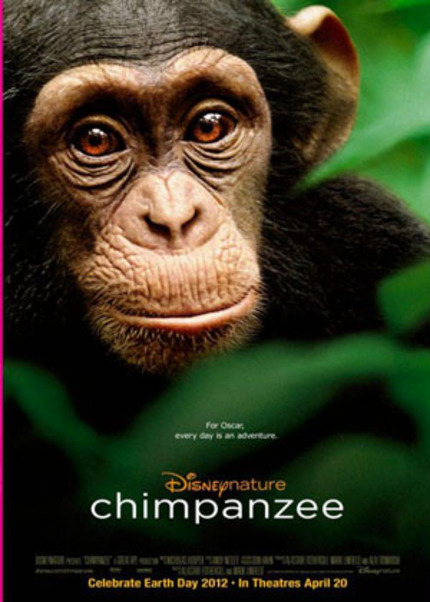Review: CHIMPANZEE, From Disney and BBC's Natural History Unit

Of late, the BBC has partnered quite successfully with Disney, crafting a series of 90 minute features drawn from the larger documentary projects. Disney's "Nature" brand gets a real life, sometimes juniorized version of the central narrative, while the BBC finds another outlet for its footage, no doubt facilitating more long term or on-their-own financially risky projects.
This synergy between these two teams has resulted in Chimpanzee, a story that on first blush seems like it could only have been drafted at a story meeting deep in the house the Mouse built. To the tune of some snappy jump-Jazz, we meet a chimp that we're told is named Oscar. He's playful, adorable, and we watch him jump about and do chimpy things in the middle of a jungle.
For those familiar with the other BBC docs, it'll be no surprise just how engaging these animals are to watch in their natural habitat - their dextrous fingers delicately pair bonding by picking out gnats, the astonishing way they pull apart the stems of leaves to use as fishing poles for ants.
About halfway through the film, when young Oscar is about 3 years old, his mother is killed by a leopard. Usually, without siblings to care for him, an ape in this situation would be left to die. Astonishingly, the Alpha-male of the tribe "adopts" Oscar, protecting him from adversaries and showing him the ropes to adult hood.
This behaviour is all the more remarkable because with the Alpha's guard down, it allows external groups of chimps to raid the community. The Alpha's compassion for a single member of the tribe actually results in near tragedy for the group. Again, in a move that if it wasn't true it might be considered trite, the invading group is led by a harrowing looking creature aptly named "Scar". Sure, the scary music upon his arrival heightens our reactions to him, but the distorted facial features and abrasions really do make him seem like a member of a typical good guy/bad guy narrative a la Lion King.
This is a film for kids, at its heart, but the filmmakers do not shy away from the actual behaviours of the creatures they're capturing visually. Yes, the almost criminally catchy music gets annoying, and the narration by Tim Allen is full of snarky comedy, continuing the tone he takes in the Toy Story films, but that's obviously a conscious decision by the filmmakers to appeal to a demographic not used to sitting still for 90 minutes of being fed "knowledge".
For those more jaded, think of Chimpanzee as a trifle or vignette, a kind of kid-friendly take on the larger whole. I feared greatly that we'd have little more than sugar coated beastie footage, and part of the film does play that way. In the end, however, we have something that's both entertaining to children and a remarkable film documentation of animal behaviour that's rarely been seen. By following the group for such a long period of time, the filmmakers are able to provide context to the story, and do so with the stunning, simply sublime quality of photography that we've come to expect from this group.
This is a film where there's not a single human being on screen until the endcredits, we're placed for the duration in the middle of a deep and dark jungle. The film was shot in Cote d'Ivoire and Uganda, not exactly super easy to navigate places , by a team well familiar with this type of harsh terrain. I was very pleased to see that the "making of" elements usually tagged on the back of the BBC docs show up here during the end credits, showing, if only briefly, the brutal conditions that the crew underwent to capture such a tale.
Sure the film doesn't touch on innumerable issues - the diminishing habitat of these animals, the political situation in the region that they live in, the decades upon decades of civil unrest that has plagued that area of the world. That, of course, is the stuff of a larger, adult focused doc, one that the BBC is eminently capable of producing with this remarkable footage. While the film is narrow in scope, and aimed at a children's audience, it nonetheless managed to be both captivating and extremely provocative with its imagery and narrative.
More than suitable for young viewers, yet captivating even for those older in age (if still somewhat young at heart), Chimpanzee proves to be the perfect blend between the rigorous, ground-breaking nature photography of the BBC unit and the skillful editing and storytelling of Disney's studio.
Note that Disney has agreed to share a portion of the first week's box office with the Dr. Jane Goodall Foundation. Read more about that with the SCREENANARCHY review of Dame Goodall here.
Chimpanzee
Director(s)
- Alastair Fothergill
- Mark Linfield
Writer(s)
- Alastair Fothergill (original concept)
- Mark Linfield (original concept)
- Mark Linfield
- Alastair Fothergill
- Don Hahn
Cast
- Tim Allen

Do you feel this content is inappropriate or infringes upon your rights? Click here to report it, or see our DMCA policy.






